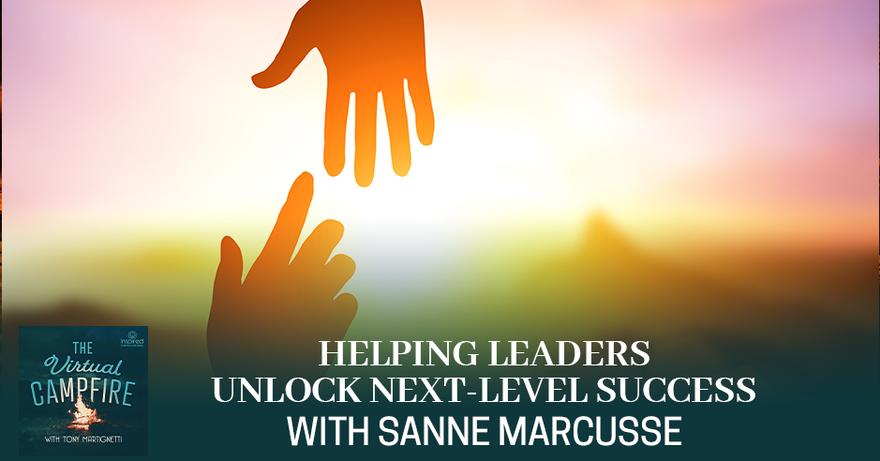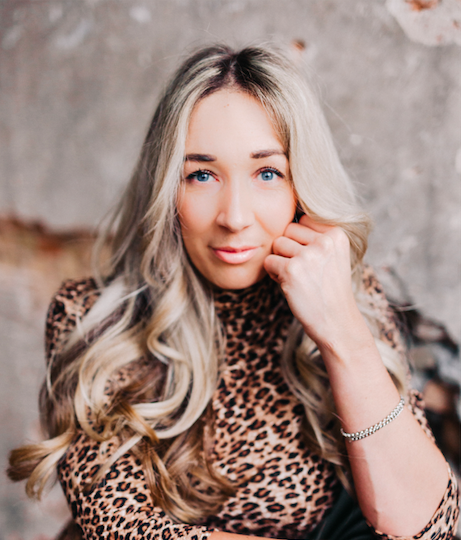Helping Leaders Unlock Next-Level Success With Sanne Marcusse

Perfectionism can be detrimental to your mind and body and can be a real impediment to your bid for success. In this episode, high-level coach and personal development expert, Sanne Marcusse, joins Tony Martignetti to share about her work in helping leaders achieve next-level success without having to sacrifice their health, relationships, and family life. Get to know Sanne’s background as she shares her journey and the years of stress she endured due to perfectionism. Sanne and Tony explore the pivotal moment when Sanne decided to take action that eventually led her to next-level success. Tune in and learn how you can make the impossible possible without killing yourself slowly in the process.
---
Listen to the podcast here:
Helping Leaders Unlock Next-Level Success With Sanne Marcusse
It is my honor to introduce you to my guest, Sanne Marcusse. Sanne is a high-level coach and leadership and personal development expert. She helps driven entrepreneurs and individuals to reach their next level of success in life and in business without sacrificing their health relationships and family life. She believes there's always a way more possible than people think and it's her mission to make the impossible possible. Sanne creates space and freedom. She is dedicated to help people do what they love to do, use their gifts and potential and feel more fulfilled. She lives in the Netherlands with her husband and two beautiful girls. I want to welcome you to the show, Sanne.
Thank you, Tony.
It’s a pleasure to have you here.
Thank you.
I'm looking forward to hearing all about your story and finding out how you came to this place in your life where you're making such an impact on people's lives.
What do you want to know first?
We're going to find out everything. Let me tell you a little bit about how we roll on the show. The show is all about understanding people's flashpoints. A flashpoint is the times in your life that have ignited your gift into the world and created something powerful for you and for the people around you. There could be one or there could be many of these flashpoints in your life. I'm going to give you the space to share your story and share what you're called to share. Along the way, we’ll pause and see what's showing up. That's what we're hoping to hear from you. I'm going to give you space and let you take it from here. I know we're going to know some amazing things that have come from your story.
Thank you. There are many flashpoints, but I will point out a few. Throughout my whole life, since I was young, stress, fear, and perfectionism had a big impact on me or that owned me. I didn't realize it at that young age, but I found that out later in my life. I dealt a lot with the physical things of stress. Once I became aware that perfectionism and fear owned me so much, I started to realize how much impact it had on my body. I had a lot of headaches almost every day since I was 12 or 13 years old. I had a lot of things that are wrong in my body, but without signals, that the doctors could say what it was. There was nothing wrong on the inside of my body, but I had a lot of pain and things going on.
Live your life how you want to live it.
It turned out that was all stress because of perfectionism. That's the background of where I'm coming from personally. It was in 2016 that I started to realize that I need to go take care of myself. Before that time, I was already working on myself for years, dealing with myself, letting go of perfectionism and acknowledging who I am. 2016 was a turning point for me because I was so tired of how I looked and how I felt, especially how I felt in my body that I made a powerful decision. I made the decision that I was going to work on myself, especially on my body and my physical side. I wouldn't stop until I achieved what I wanted.
That decision is the decision that brought me here now. That was a big turning point for me because I started with working out, tracking my nutrition, and working on my body goals. Because I started working on that, I also learned how much the mind comes in. It's not just physical that I wanted to change. I realized that I had to change a lot on the inside as well. I was starting to get aware of what mindset was and how that goes along with working on your body. I started lifting weights a lot, which made me mentally so strong. I felt more confident. I felt better in my body. That was the start of my big transformation.
I know there's more to the story, but I wanted to recognize a few things. First of all, hearing your story makes me think how powerful is the connection between mind and body. When you start working on one, the other starts to change and also improves. Even if you started to think that, “If I think differently about my body, then I have a better image of myself even if I didn't do any lifting weights.” There's something about it that is powerful. I also wanted to get back to this perfection. This pain and perfection that you had, where did it come from? Was there something an element of perfection that you had seen in your family or was this something that you just inflicted upon yourself because you said, “This is who I want it to be. This is who I am. I am someone who strives to do the best and to have to have the best in myself?”
It's a combination of both. The biggest part is that I had the limiting belief that I wasn't good enough. I didn't belong, so I always felt that I needed to prove myself. I love perfect things. I love it when something's perfectly done. I'm happy about it. It's also in my family. My mom and dad are also perfectionists, but the limiting belief had a big role in perfectionism and stress.
Let's not forget that we live in a society that values perfection. Everything around you seem to have this image of like, “This is what we need to be striving for is perfection.” I wanted to connect with that for a moment and say that's what was coming up at around. I wanted to see where that came from before we move forward in the story and recognize that. As you move forward and you started to see what you want to work on yourself, there's also an element that perfection in creating even positive things can be challenging too, is to not strive too much to be perfect in self-improvement.
As I was in my process of working on myself, I also realized that I wanted to help others. That has been something that goes back to when I was young as well. People always tell their life stories to me randomly. I always help people with whatever. I always see possibilities, new chances and opportunities for other people. As I was in my own process of transformation, I started helping other people. I got the opportunity to become a coach and to help other people to reach their goals for their body and for their mind and the nutrition and become the version of themselves that they wanted to be. That's where the coaching part came in or at least professionally, because I feel I've been coaching for my whole life. Because of my own transformation, I wanted to give that to other people as well because I started to feel so good.
The first angle was when you got into coaching, because I know there's more to it than like, “I became a coach.” I know there's a long journey beyond jumping into the practice of coaching.
It’s not that much actually.

Your own transformation is the most powerful part of it. It’s seeing for yourself that you are limiting yourself by seeing that not-enoughness and perfectionism. Those things were getting your way and when you connected with your way of thinking your mind and your body and working on them, but not to a fault, which was the potential problem that you have. The gotcha people often have is when they take it too far.
I've been too far to be honest. My perfectionism wasn't over in a split second. I got obsessed with nutrition until to a point that I freak out when I didn't have control, like going out for dinner that I couldn't track my food. Perfectionism is also being a control freak, or at least I was a control freak. Everything has to do with control. Within that transformation, I was going through a lot of different processes like falling down and standing up again multiple times. I've been deep for myself, but that was needed to let everything go and getting control again. Taking over control over myself and my life instead of my perfectionism had that.
There are so many faces of perfection. There are so many stages of perfection. It didn't arrive one day and you're like, “I'm over it.” You have to see where it shows up and then how to manage and tame that beast. When you started to get into coaching, what were the things you were seeing most in people when you started to see that as you're coaching them? Were you seeing a bunch of perfectionists come into your doors and you're saying like, “I know you?”
The people who I coached, in the beginning, weren’t a lot like me, but they had a lot of physical goals. They want to lose weight or look different in the mirror. It all turned out exactly the same thing as I was dealing with because that's how it goes.
Oftentimes, you can see these things because your struggle with the same demons, but they have different faces. That's what makes you a good coach, is because you suffer the same afflictions. I don't think they ever quite go away, but you know how to manage them better. You have the better tools.
It's also accepting things and letting them be, but not doing anything with it.
Tell me about the early days of coaching. You've been coaching for quite a few years now. In that time of coaching, what were the early days about? Was it in terms of finding people? What was the biggest challenge that you faced?
It was dealing with myself. I had to decide how I wanted to show up. I was a people pleaser.
Everything starts with you.
There's more to dig into that because I often hear this element of the best way to coach is to first coach yourself, go inside before you go outside. That's the power of the early years of coaching is to figure out how deep you're willing to go in order to be able to go and take people deeper.
I'm pretty straight to the point. I did have a lot of issues in real-life coaching sessions, that was not the problem. The sales calls or getting on the phone with someone were the things that are a struggle for me because I didn't like phone calls and talking to people. I had all kinds of beliefs around that which made it very hard for myself. When I was in a coaching call with a client, I'm all in and go deep. I have no limits. For me, that was the hardest part, to connect with people and offer them something.
It’s like you want to fast forward to that moment of like, “Let's get past all of the initial stuff and let's get right into it deeply.” Tell me more about the journey to getting to where you are now. What were some things that you feel are the big game changers for you? Not just in the coaching, but also in becoming who you are. What did you do before you became a coach?
I was a hairdresser.
How did you flip the script for yourself in terms of understanding, “How am I going to allow people to see me in a different way?”
That has nothing to do with being a hairdresser. When I was a coach or what do you mean?
I'm sharing this because this is something that I hear a lot from people when they change careers and when they change who they are in terms of profession-wise, going through a transition, it's hard to go to people who used to know you and say, “I'm the longer that. This is who I am. I've transformed. I've gone through a transformation.” At first, you get met with the glance of what makes you a coach or what makes you qualified. You have to come up with your story and tell it with credibility. You have to first convince yourself.
That was a pretty natural process because I didn't stop being a hairdresser and went into coaching because I kept doing the hairdresser thing and also started coaching a bit. I didn't have friends. I didn't have a lot of people around me. I always felt that I never belonged somewhere or that people liked me. I had to deal with a lot of people. Even until now, my grandfather and grandmother have no idea what I do, and they never asked. Can you imagine what kind of relationship I have with them? I always feel like a lot of people are afraid of me. That's weird maybe, but that's how it is. It was a natural process. I decided that I was going into coaching and sharing my own transformation. I just did it. People ask questions. I have no idea what I told them.

There's something about your persona that I've always found remarkable. It’s that you don't necessarily care too much about what people think. I don't mean that in a negative way. You have an energy about like, “This is who I am. I'm showing up as I am now.” Hearing the story of what brought you here, the power in it isn’t the transformation. It’s that you don't necessarily measure yourself against the public domain of what people think. Your power comes from within now.
I didn't always feel that way, but now I feel that way. We all do care a little bit what other people think, but I'm just doing my thing. If you like it or not, I don't care.
That's part of the message that comes out of this, is for people to maybe do that more often. It’s to not care what other people think and own what's inside and what your message is and what the power of that message is and let it out.
A lot of people are not thinking of “what do I want” or maybe they think of it, but they're not taking action on it. A lot of people don't live the life that they want to live because of what may be other people could think or they think it's impossible. I don't want to hold myself to it because I want to live my life how I want to live it.
That's part of maybe what you are sharing. You can tell me more about this. Is that what you're working with your clients on, is that power of not caring what other people think and let's see what's possible by embracing the impossible, don't let people get in your way?
I first started by coaching people on body goals and mindset because I grew as a person in who I was and being an entrepreneur. In my coaching, I realized, “This is so much bigger than just the person. I want to help people create lives that I want to live and do the work that they want to do.” I started to realize that I wanted to bring in the bigger picture, but I always say that everything starts with you. I am the fundament of what I create. Everything starts with taking care of yourself, taking good care of your body, creating space for yourself and what do you need and what do you want. That's, for me, always the place to come from. That's what I built everything around for myself but also with my clients. Because I grew in that whole process, I realized that it was what I wanted to do in this world.
I love the way you described and it's a great way to embrace the journey for people to see that. What's been the biggest takeaway so far when you reflect back on your journey so far to getting here, the battles with the perfection, the battles with the not enoughness that has now brought you to where you are now?
Believe that there's much more possible than you think and take action on it.
There are a few things. It’s believing in something. Believe that there's more possible than you think, and then take action on it, that's the first one. I knew that I wanted to create more than I was doing. I wanted to grow as a person. By making that decision, I went full in and let all the perfectionism, all of the fear, everything that was going on, I let it come up, but I didn't let it control me. For example, sometimes when I was cooking, I had a lot of stress because of time or I wanted to do other things or that I needed to do X, Y, and Z because it was on my to-do list that day and I didn't do it. I didn't have time anymore. I was all freaked out.
I was like, “I cannot do anything about it because I have to cook for my family. I'm at this moment. The only thing I can do now is doing what I have to do and the rest will come later.” By doing those small things like turning that stress points around or letting it be, but do nothing with it, I could stop cooking dinner and do four things for my to-do list, but then I had no dinner. Realizing those little things and letting that be and realizing, “The world didn't explode because I didn't do my to-do list.” That was a big part of it, letting go of perfectionism and stress.
Don't let your to-do list become your master. I'm trying to do this for myself so I can understand and drive this point home, but I see the to-do list can be challenging. It's like the inbox. It's one of those things that's a great and powerful tool, but it's a tool. It's not your master.
Now I don't have a lot on my to-do list. I learned to swap it all around. When it comes down to being not good enough is, first of all, not holding myself back because of that so doing the things anyway even if I felt I wasn't good enough for it. I was proving to myself that I could do it. I was good enough and people can like me. I'm a good coach and I can transform people's lives. I started to prove to myself that I was enough or that I was a powerful woman who can show her power in the world.
What I love about that is it's about modeling the way in some fashion by doing it and doing it even imperfectly is completely fine. In that way, it shows people that you don't have to have it all figured out and you can still take a step.
I have a lot of things not figured out, but I keep going.
Many people are paralyzed by the fact that they feel like their next step has to be perfect. That's a lot of what is happening. Even now in this time, a lot of people are feeling as though, “I don't know what to do next.” Maybe they lost their job or they're in transition and they're maybe thinking, “What do I do next?” Maybe the next step is to try something different. Try is the keyword, not do.
Try and explore. Only by exploring you will figure out what's for you or whatnot.

That's a good way of looking at it. Tell me something else. Is there anything else that you want to make sure people hear from your journey that is an important insight about what they might need on their journey for people in transition or people who are struggling to find time to get things done in their lives?
I don't believe in finding the time. It's creating time. It's two things. One is checking in with yourself, “What do I want and how do I want my week, my life, my business or my family to look like,” and being honest about that because that’s the real problem. We think that we want a lot, but is that what we want? Are we willing to make it happen? That's where it all starts. Allowing yourself to create space and freedom and going from there instead of living from your calendar or what other people expect from you. Start creating from the inside out, what do you want and then you will find a way to create that.
It's the more singular focus you can have. The more that you can clear the clutter and create time from what you want, then it becomes more powerful, the way you plan your days, your weeks, your time.
There's often the fear of losing something. It's not that you lose something when you choose for yourself because you will create so much better things when you start from yourself.
It makes me think of the theory of the Fear of Missing Out, FOMO, that people most of the time have. The fear of missing out on that next opportunity to come to the inbox or the next thing that's going to come through the door. In reality, there's some JOMO, which is that Joy of Missing Out. I get the clarity that I know exactly what I need to get done because I've got all the clutter out. I know exactly what I'm executing on. It's so clearly aligned with my heart's purpose that I couldn't be more fulfilled by that.
That's what it is too, fulfillment. You can only feel fulfilled when you do what you want to do.
Sometimes the other things seem like they're part of the fulfillment game because they're fulfilling your time. They're fulfilling, but they're not fulfilling in terms of your heart. They're fulfilling in terms of time, not you. I've loved this journey we're going on because we've touched so many great insights. Before we go near the wrapping up part of this, I wanted to give you a chance if there's anything else you wanted to share.
Everything starts with a powerful decision. Whatever you want to do, it starts with making a powerful decision.
Everything starts with a powerful decision.
Here's one last question for you. What is one book that has had an impact on your life and why? If it's more than one book, I'll let it slide.
I can go with one. It's Straight-Line Leadership from Dusan Djukich. It's a book full of powerful distinctions like commitment versus trying. It's all distinctions, which are powerful. That helped me see that when I make powerful decisions and go with powerful distinctions, I can create whatever I want. That was a big game-changer.
I'm intrigued by this because this is an area where a lot of people get tripped up by not using the power of words, when you make that distinction that this is where I'm coming from. If I understand this correctly, that's exactly what I'm hearing, which is that when you start to say, “I'm making this commitment in this way.” The distinction is clear. I can't wait to check this out.
Read it because it's a powerful tool.
Thank you so much for coming on the show and sharing your insights and your story. I feel like it's going to resonate so much with the people out there who are reading because this is so common. It is something that a lot of people feel, this element of struggling with perfection and struggling with the not enoughness. Thank you for sharing that. Where can people find out more information about you and your coaching and where they can reach out to find more about you?
I have my website, SanneMarcusse.com, and my social media. I'm on LinkedIn, Instagram, and Facebook. Put my name in it and you will find me.
You have a program going on right now around emotional. Tell me more about it.
It's High-Level Emotional Power. It has everything to do with emotion like how you do with a certain emotion, what is an emotion and how can you make sure that you are in control instead of that your emotions or your feelings have control over you so that you can show up powerful in the world and what you want to create.
That sounds like it's such a great program. I'm hoping that people will be able to jump on the chance to do that. Thank you so much for coming to the show. Thank you to the readers for coming on the journey. That's a wrap. I’m looking forward to talking to you soon.
Important Links:
- Sanne Marcusse
- Straight-Line Leadership
- LinkedIn - Sanne Marcusse
- Instagram - Sanne Marcusse
- Facebook - Sanne Marcusse
About Sanne Marcusse

It’s my mission to make the impossible possible. To make dreams come true.
I’m a leadership expert who helps driven individuals to reach their next level of success in life and business.
Once you take ownership of yourself and become the leader of your own life, you are able to create what you really want.
I created the impossible for myself more than once, and it’s what I wish for you too. There is always way more possible than we think! The challenge which lies in there, drives me to continue to grow to the next level over and over again.


0 comments
Leave a comment
Please log in or register to post a comment